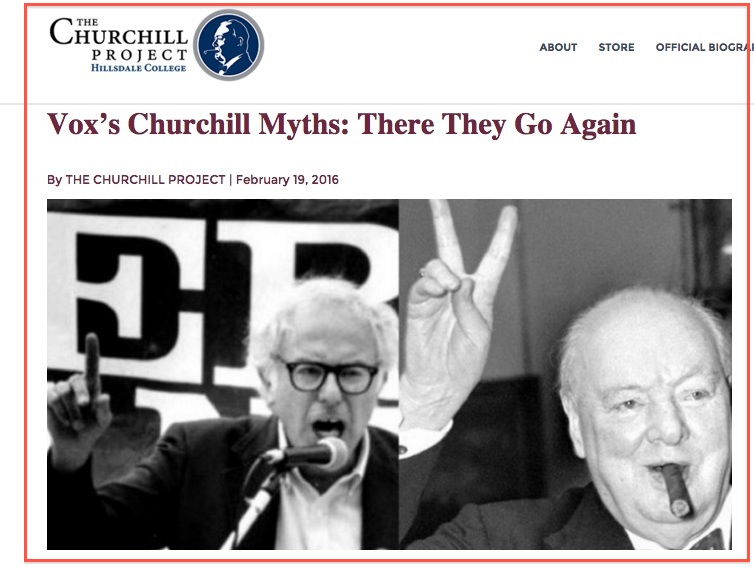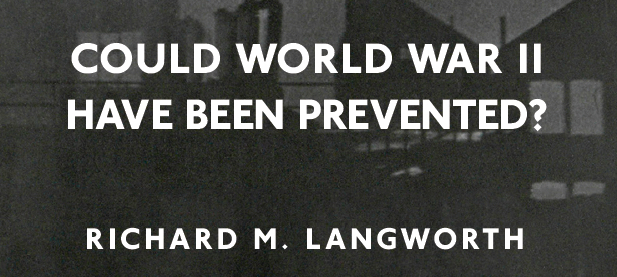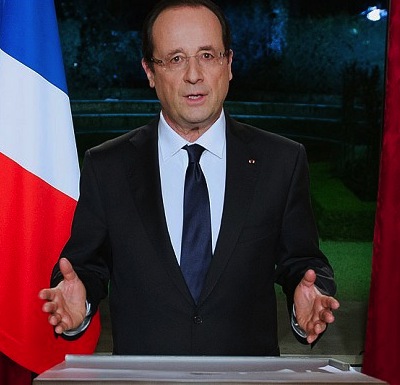Category: Research Topics
Britain’s Leave Debate: Who’s Churchill? Who’s Stalin?
The campaign to Leave is heating up. Take Grassroots Out, a “combined operation” supporting Brexit—the campaign for Great Britain to exit the European Union. G-O fielded a broad spectrum of speakers in London February 19th. Along with UK Independence Party leader Nigel Farage were Conservative Sir William Cash, Labour’s Kate Hoey, economist Ruth Lea, and a London cab driver.
The most unexpected Leave speaker was the far-left former Labour MP and head of the socialist Respect Party. Mr. George Galloway was immediately queried about his new colleagues.
“We are not pals,” Galloway replied.…

Vox Non-Populi: More Churchill Mythology
Winston Churchill was no saint; it is a disservice to pretend he was. But he is too complex to be pigeonholed by writers who criticize selectively. Hillsdale College’s Churchill Project responds to the mythology. Read full article.
ExcerptWinston Churchill is in the news, as is often the case. On February 11th, Presidential candidate Bernie Sanders had words of praise for Churchill’s war leadership. Vox Media has criticized him and Churchill in sharp language. Are the criticisms of Churchill true?
During the Democrat debate on 11 February 2-16, candidates were asked to name two leaders, one American and one foreign, who would influence their policy decisions.…
“Churchill and his Military Commanders”
Part I: “War Statesmanship,” in “Churchill and his Military Commanders,” by Eliot A. Cohen. Read in full on the Hillsdale College Churchill Project.
“The generals had in mind a concept of civil-military relations to which many still, amazingly, pay lip service: a world in which civilians provide resources, set goals, and step out of the way to let professionals do their work. War statesmanship, in Churchill’s view, focused at the apex of government an array of considerations and calculations that even those one rung down could not fully fathom.”
Eliot A. Cohen is professor of strategic studies at Johns Hopkins School of Advanced International Studies, and has served as Counselor of the Department of State.…
Last Try to Avoid Hell, 1914
“Saving the Nations from Hell”: The “Kingly Conference,” 1914 (Excerpt)
(Read more at Hillsdale College Churchill Project)
Churchill’s faith in personal diplomacy—solving intractable problems by meetings at the highest level—was famously expressed during World War II.
Less widely known is Churchill’s 1914 proposal for a conference of heads of state (including, it seems, French President Raymond Poincaré) in an effort to head-off World War I. The scheme failed, but not for Churchill’s lack of trying.
There is little on Churchill’s “kingly conference” in the literature. There is no reference in Churchill’s The World Crisis, Asquith’s memoirs, or biographies by Manchester, Jenkins, Rose, Charmley and Birkenhead, though Sir Martin Gilbert includes in the official biography an excerpt from a cabinet member which records Churchill’s words in the cabinet of July 27th:
Churchill said we were now in a better than average condition, & the fleet was at war strength….Churchill,…
Winston Churchill: Myth and Reality
Per the previous post, I append for reader comment the contents of my next book, Winston Churchill, Myth and Reality: What Churchill Stood For.
I have written on most of these matters in the past; the book recasts it afresh. I also acknowledge and cross-reference the work of experts who know far more than I, particularly in the fields of genealogy and medicine. I would be glad to hear your thoughts; please use the “contact” page.
The historian David Stafford wrote: “Myth only develops and takes hold when the time is right, and the climate has long been ripe for the emergence of myths about a wartime hero who stood firm against a totalitarian foe and smote an evil empire.”…
Myths about Churchill: Coming Up
Winston Churchill: Urban Myths and Reality: Lies, Fables, Myths, Distortions and Things that Go Bump in the Night.
Not a day passes when Sir Winston Churchill, who proved himself indispensable when freedom needed him, is not accused of something, from alcoholism to war crimes—often without serious attribution, or through selective quotes, arranged and cropped so as to advance the preconceived notion.
On that electronic Speakers’ Corner we know as the Internet, Churchill bubbles in a gurgling, digital soup, where he can say anything, or do anything, from hiding his foreknowledge of Pearl Harbor to firebombing Dresden.…

Reviews of “Churchill and the Avoidable War”

Paris, 13 November 2015: A Churchill Moment for M. Hollande
“A Churchill Moment for M. Hollande” is excerpted from my article in The American Spectator, 18 November 2015.
Dear M. Hollande…The news from France is very bad and I grieve for the gallant French people who have fallen into this terrible misfortune. Nothing will alter our feelings towards them or our faith that the genius of France will rise again. —Winston S. Churchill, 4 June 1940
On the 2015 Paris attacks: With every murderous threat to civilization we are asked: “Where are our Churchills?” There isn’t one, and we should not expect one.…
Was WW2 Avoidable?
continued from previous post…
Churchill and the Avoidable War
Preface
This book examines Churchill’s theory that “timely action” could have forced Hitler to recoil, and a devastating catastrophe avoided. We consider his proposals, and the degree to which he pursued them. Churchill was both right and wrong. He was right that Hitler could have been stopped. He was wrong in not doing all he could to stop him. The result is a corrective to traditional arguments, both of Churchill’s critics and defenders. Whether the war was avoidable hangs on these issues.
Chapter 1. Germany Arming: Encountering Hitler, 1930-34
“There is no difficulty at all in having cordial relations between the peoples….But…






